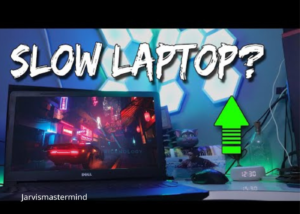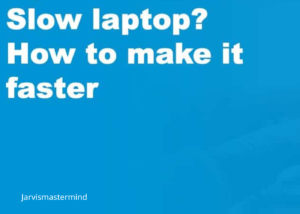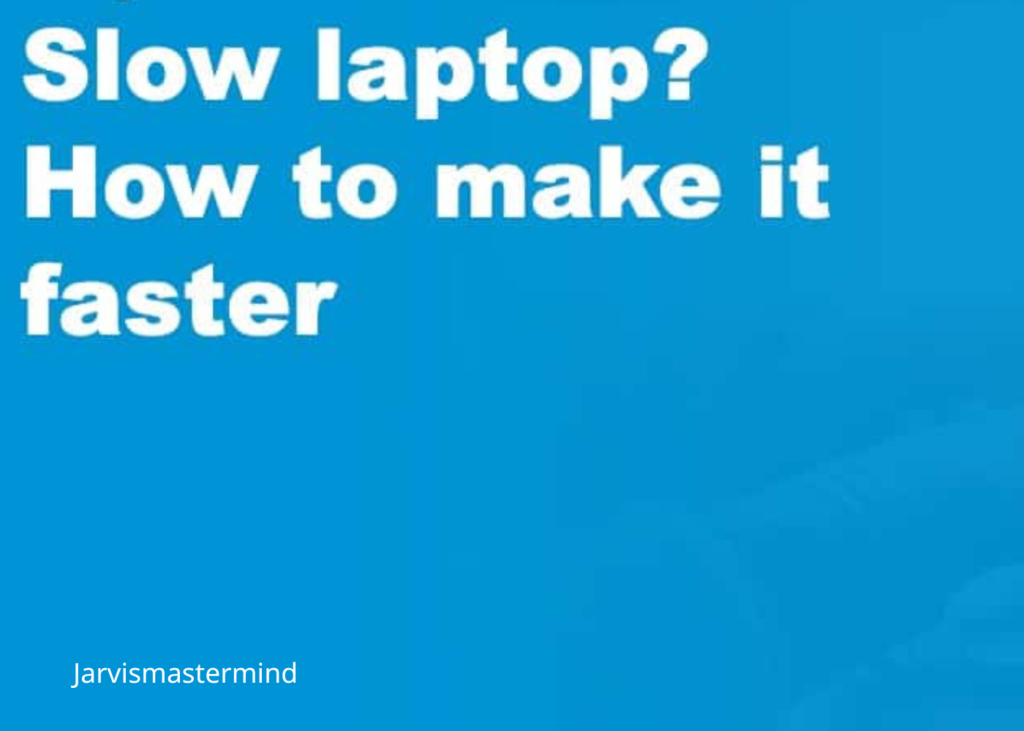A slow gaming laptop can be incredibly frustrating, especially when you’re in the middle of an intense gaming session and your system just can’t keep up. However, the good news is that there are several effective strategies you can employ to give your gaming laptop a speed boost and enjoy smoother gameplay. In this guide, we’ll explore various methods and tips on how to fix a slow gaming laptop, so you can get back to playing your favorite games without any performance hiccups. Whether you’re dealing with lag, low frame rates, or general system sluggishness, we’ve got you covered with solutions to help you optimize your gaming experience, with some steps on how to fix a slow gaming laptop.
How to fix a slow gaming laptop

Let’s address the issue of a slow gaming laptop with practical, step-by-step instructions:
Clean and Cool Your Laptop
Imagine your laptop as a car that’s been through a dusty desert; it needs a good wash and some shade.
Clean Dust and Debris
Turn off your laptop and gently clean out the accumulated dust and debris from the vents and fans.
Cooling Pads Invest in a cooling pad to help regulate your laptop’s temperature during gaming sessions.
Best budget gaming monitor for laptop
Upgrade Your Hardware
Giving your laptop a hardware boost is like upgrading to a faster engine for your car:
- RAM Upgrades: Consider adding more RAM to your laptop. It’s a cost-effective way to improve multitasking and overall performance.
- Install an SSD: If you’re still using a traditional hard drive, consider upgrading to a Solid-State Drive (SSD). This can drastically reduce load times and improve responsiveness.
- Graphics Card: One of the steps on how to fix a slow gaming laptop
- If you’re into serious gaming, a dedicated graphics card upgrade can be a game-changer
See price for acer gaming laptop https://amzn.to/41S3o4J
Manage Background Applications
One of the steps on how to fix a slow laptop fewer distractions lead to better focus:
- Disable Unnecessary Startup Programs: Head to your Task Manager and disable programs that start up with your laptop.
- In-Game Settings: Adjust the in-game graphics settings to a level that your laptop can handle without breaking a sweat.
Defragment Your Hard Drive
Fragmenting helps your laptop access data more efficiently.
Search for ‘Defragment and Optimize Drives’ in Windows Run this utility to defragment your hard drive.
Update Drivers and Software
Think of this as updating your GPS for a smoother road trip; keeping everything current is essential:
- Graphics and Driver Updates: Visit the websites of your graphics card and laptop manufacturer to ensure you have the latest drivers.
- System Updates: Keep your operating system and game clients up to date.
See price for ACEMAGIC gaming laptop https://amzn.to/47NADYl
Remove Malware and Bloat ware

Clearing out malware and bloat ware is like tidying up your workspace for better focus:
- Run a Malware Scan: Use reputable antivirus software to scan for malware and eliminate any threats.
- Uninstall Unwanted Software: Get rid of applications you no longer use or need. These can slow down your system.
- By following these practical steps, you can rejuvenate your gaming laptop and get back to enjoying lag-free, smooth gameplay. Remember, a little care goes a long way in keeping your gaming experience at its best.
How to Diagnose the Problem: Is Your Gaming Laptop Running Slow?
Picture this: you’re all set for an exciting gaming session, but your laptop’s performance is dragging you down. Don’t worry, we’re here to help you pinpoint the issue so you can learn how to fix a slow gaming laptop
And get back to enjoying your favorite games:
Monitor Hardware Temperatures
Think of your laptop as a runner; it performs best at the right temperature.
- Download a Temperature Monitoring Tool: Look for software like HWMonitor or Core Temp.
- Install and run it to keep an eye on your laptop’s temperature while gaming.
- Check for Overheating: If the temperature climbs too high (above 90°C for the CPU or GPU), overheating might be your culprit.
Best budget gaming monitor for ps4 this year!
Inspect System Specifications
If there is a problem with the system specifications, then you need to know how to fix a slow laptop As we mentioned understanding your laptop’s capabilities is like knowing your car’s engine size:
- Check Your Laptop’s Specs: Find out your laptop’s processor, RAM, and graphics card. You may need this information to compare against a game’s requirements.
- Verify Game Requirements: Check the game’s system requirements. If your laptop falls significantly short, it might be time to lower your in-game settings.
Analyze Running Processes
Open Task Manager (Ctrl+Shift+Esc) Look at the processes running while gaming. High CPU or RAM usage could point to resource-hungry background applications.
- End Unnecessary Processes: Close down applications you’re not using while gaming.
- This frees up resources for your game.
See price for ASUS gaming laptop https://amzn.to/48O3rAL
Scan for Malware and Unwanted Software
- Run a Malware Scan: Use your trusted antivirus software to scan for malware and eliminate any threats.
- Uninstall Unwanted Software: Clean up your laptop by removing any unnecessary programs that could be sapping its performance.
- By taking these steps, you’ll have a much clearer picture of why your gaming laptop is running slowly.
- And once you’ve identified the issue, You need to know how to fix a slow laptop that we have mentioned.
- Remember, your laptop can regain its speed with a little care and attention.
Common Causes of a Slow Gaming Laptop
Ever found yourself in the midst of an epic gaming adventure, only to be held back by a slow laptop? You’re not alone.
Let’s dive into the common reasons your gaming how to fix a slow gaming laptop.
Overheating Issues
If you find these common reasons, you should refer to the steps on how to fix a slow laptop that we mentioned. Think of your laptop as a campfire, too much heat can dampen the fun:
- Feel the Heat: During intense gaming sessions, touch your laptop to see if it’s excessively hot.
- Overheating can slow down your laptop and cause performance issues.
- Feel the Heat: During intense gaming sessions, touch your laptop to see if it’s excessively hot. Overheating can slow down your laptop and cause performance issues.
- Clean the Dust: Laptops can accumulate dust and debris over time, clogging air vents and causing overheating. Use a can of compressed air to gently clean out these vents.
- Invest in Cooling Solutions: Consider using a cooling pad or an external fan to help regulate your laptop’s temperature during gaming.
Outdated Hardware
If you find these common reasons, you should refer to the steps on how to fix a slow laptop that we mentioned
- Check Your Laptop’s Age: Older laptops may not meet the system requirements of newer games.
- Ensure your hardware is still up to the task.
- Upgrade Your RAM: Adding more RAM can significantly improve your laptop’s multitasking abilities and overall performance.
- Switch to an SSD: If you’re using a traditional hard drive, upgrading to a Solid-State Drive (SSD) can boost your laptop’s speed, reducing load times.
- Consider a Graphics Card Upgrade: If you’re serious about gaming, a dedicated graphics card can provide a substantial performance boost.
See price for acer gaming laptop https://amzn.to/3NWFEGP
Resource-Hungry Background Applications
Resource background applications are among the common reasons that if you find them on your device, you must follow the steps we mentioned for How to Fix a Slow Laptop:
- Open Task Manager (Ctrl+Shift+Esc): Examine the list of running processes while gaming.
- High CPU or RAM usage may indicate background applications are hogging resources.
- Close Unnecessary Applications: Shut down any programs or apps that you’re not using while gaming.
- This frees up valuable resources for your game.
Disk Fragmentation
Laptop’s storage a little organization can make it more efficient, you don’t need to know how to fix a slow laptop
Search for ‘Defragment and Optimize Drives’ in Windows: Run this utility to defragment your hard drive.
It may take some time, but it can help your laptop access data more efficiently.
By understanding these common causes of a slow gaming laptop, you’re taking the first step toward a faster, more enjoyable gaming experience. Stay patient and compassionate with your laptop.
Conclusion
You’ve made it through the journey of learning how to fix a slow gaming laptop.
Now that you’ve armed yourself with valuable insights and practical solutions, you’re well-prepared to breathe new life into your trusty gaming companion.
Remember, a slow gaming laptop can be a temporary setback, not a permanent roadblock.
By following the steps you can address common issues like overheating, outdated hardware, resource-hungry applications, and disk fragmentation.
With patience and care, your laptop can regain its lost speed and offer you the immersive gaming experiences you crave.

